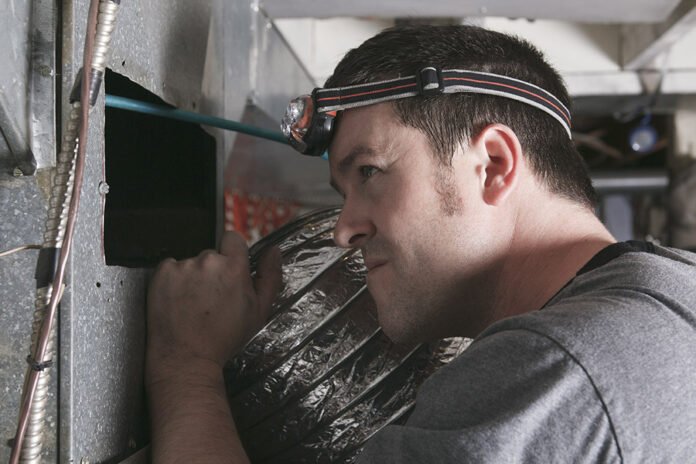Suppose today the new generations of air conditioners are designed to brave the harshest weather conditions. In that case, your device is nevertheless exposed throughout its life to wear and damage, which requires regular maintenance and cleaning. Moisture and neglect can, over time, quickly cause many problems, including the most dreaded: rust.
AC unit in a residential house
Unpleasant to see that an exterior block devoured by rust mainly affects the performance of your heating, ventilation, and air conditioning system. It will take your exterior block significantly longer to heat or cool your interior, for example, until it negatively impacts your electricity bills. In addition, left untreated, rust will eventually penetrate your unit, causing irreversible damage to your air conditioning system.
The 4 Most Common Causes of Rust on an Air Conditioner Unit
Rust begins to form when a metallic body – such as steel or iron – comes into prolonged contact with oxygen and water. Without intervention, rust will continue to eat away at the affected metal, causing irreversible structural damage. In the case of an air conditioner, the most commonly affected parts are the coils, air filters, drain pan, compressor, refrigeration lines, fan blades, and subsequent ventilation ducts.
Among the causes favoring the presence of rust, we find:
- Excess humidity
Condensation, rain, or particularly humid background air all contribute to the formation of rust. For example, suppose your air conditioning system can air conditioning your interior through its internal hot air condensation mechanism. In that case, prolonged exposure to too high a humidity level will nevertheless damage the most vulnerable metal parts of the device.
- Volatile organic compounds
In deodorizing air fresheners, paint or most household cleaning products, VOCs end up being sucked in, and can, over time, erode the refrigerant tube by copper in your air conditioning system, causing refrigerant leaks.
- Poor cleaning of your air conditioning system
Failing to worry about regularly maintaining and cleaning your air conditioner will cost you dearly. Designed to protect your air conditioning system from dust and contaminants present in the ambient air, filters that have become dirty for too long will promote an increase in the humidity level and, with it, the proliferation of rust on the fragile coils.
Outdoor units, whose condenser is often covered with leaves, twigs, and other polluting particles, require regular maintenance for optimum performance and lifespan. Without this, you expose yourself to an obstruction of the condensate drainage system and, consequently, to the advanced presence of rust.
- The lifespan of your air conditioning system
Estimated at 10 to 15 years, the life limit of an air conditioner almost inevitably exposes it to rust. Approaching its final life cycle, an air conditioner naturally begins to degrade and eventually shows signs of wear and tear: reduced airflow, unusual noises, increased electricity bills, and rust spots.
There are eight well-known tips to ensure that your air conditioning system lasts as long as possible!
How to protect your HVAC system from rust and wear?
The sooner you notice the warning signs of rust, the easier it will be for you to treat them effectively later. You will start, if necessary, by:
- Turn off your air conditioning system completely;
- Take a screwdriver and remove the side protection panels from your exterior air conditioning unit;
- Access the condenser, which would normally have a square or rectangular configuration, distinguished by its distinctive coils and fins;
- Spray, once spotted, the condenser with an anti-rust solution for coils, which should effectively dissolve the traces;
- Finish removing the rest of the rust that would resist the treatment using a brush with soft nylon bristles;
- Clean the condensate tray using a mixture of equal parts water and bleach;
- Apply a coat of anti-rust primer to the already cleaned parts of your outdoor unit;
- Reassemble everything, finally, and turn the air conditioning back on.
How to effectively prevent the formation of rust on your air conditioner?
The best way to avoid rust is still to remember to maintain your HVAC system regularly. A careful inspection will help you better eliminate clumps of dust and dirt. So think about:
- Clean your filters :
Every two weeks, ideally. Newer models of air conditioners are programmed to indicate the level of clogging of the filters and warn you of the need for future maintenance.
- Clean the condenser coils :
Approximately every two months. Use a soft-bristled brush, lambda cleaner, or homemade soap and water solution.
- Check the condition of the exterior unit :
From time to time, especially in autumn and snowy winter, look at your outdoor unit, which must be rid of dead leaves or frost.
- Clean the drain pipes :
Once again, excess humidity encourages clogging of the condensate tray, which precipitates the formation of rust. Use a long-handled brush and actively scrub the entire length of the exposed pipes.
- Choosing a protective cover for an air conditioner :
When your air conditioner is not running, it is never useless to cover it with a waterproof protective cover, which will preserve your unit from the humidity and dirt in the surrounding air.
- Call a professional air conditioner cleaning and maintenance :
HVAC system technicians can professionally inspect your air conditioning system and ensure it operates optimally. In addition, annual maintenance will ensure that your filters are clean, rust already present on the condenser coils is removed or treated, and the best possible performance from your system.












![Cinema HD APK not Working – Problems and Solutions [ May 2022 ] cinema hd errors fixed](https://techtablepro.com/wp-content/uploads/2022/05/Untitled-Design-2-218x150.jpg)



